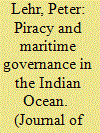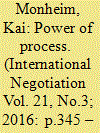| Srl | Item |
| 1 |
ID:
121103


|
|
|
|
|
| Publication |
2013.
|
| Summary/Abstract |
During the late 1990s and the early 2000s, this author conducted a comparative study on regime building in the world's three maritime 'mega regions', i.e., the Atlantic, the (Asia-) Pacific and the Indian Ocean. The aim was to explain why regime building is so difficult in the latter as compared to the former two, and why newly formed regimes tend to end up as 'sandbanks of shattered hope' soon after their inauguration. Many reasons were offered both by the author's numerous respondents and by the author himself, but amongst the findings was the widely shared opinion of specialists from various Indian Ocean Rim countries that attempts at regime building tended to fail because their aims and objectives were too lofty. Rather, it was argued that regime-building attempts should start on the relatively modest level of confidence building measures which all potential participants could agree on, such as disaster relief, search and rescue (SAR), sustainable development of marine resources, fisheries protection, and the fight against piracy. All those measures can be subsumed under the label 'maritime governance', which will be define below.
|
|
|
|
|
|
|
|
|
|
|
|
|
|
|
|
| 2 |
ID:
148541


|
|
|
|
|
| Summary/Abstract |
Management of a multilateral negotiation has frequently played a crucial role in developing global regimes but is often ignored in International Relations theory. The long-awaited UN climate summit in Copenhagen, for example, broke down in 2009 but negotiations reached agreement one year later in Cancún. This article argues that power and interests remained largely constant between Copenhagen and Cancún, and that significantly altered negotiation management by the host government and the UN explains much of the difference. An analytical framework is presented to address whether and how the management of a multilateral negotiation by the organizers increases or decreases the probability of agreement. The empirical focus is on the Danish and Mexican Presidencies of climate negotiations, with extensive evidence from participant observation and 55 interviews with senior negotiators, high-level UN officials, and lead organizers. The argument adds to the scholarship on regime development by complementing structural with process analysis.
|
|
|
|
|
|
|
|
|
|
|
|
|
|
|
|